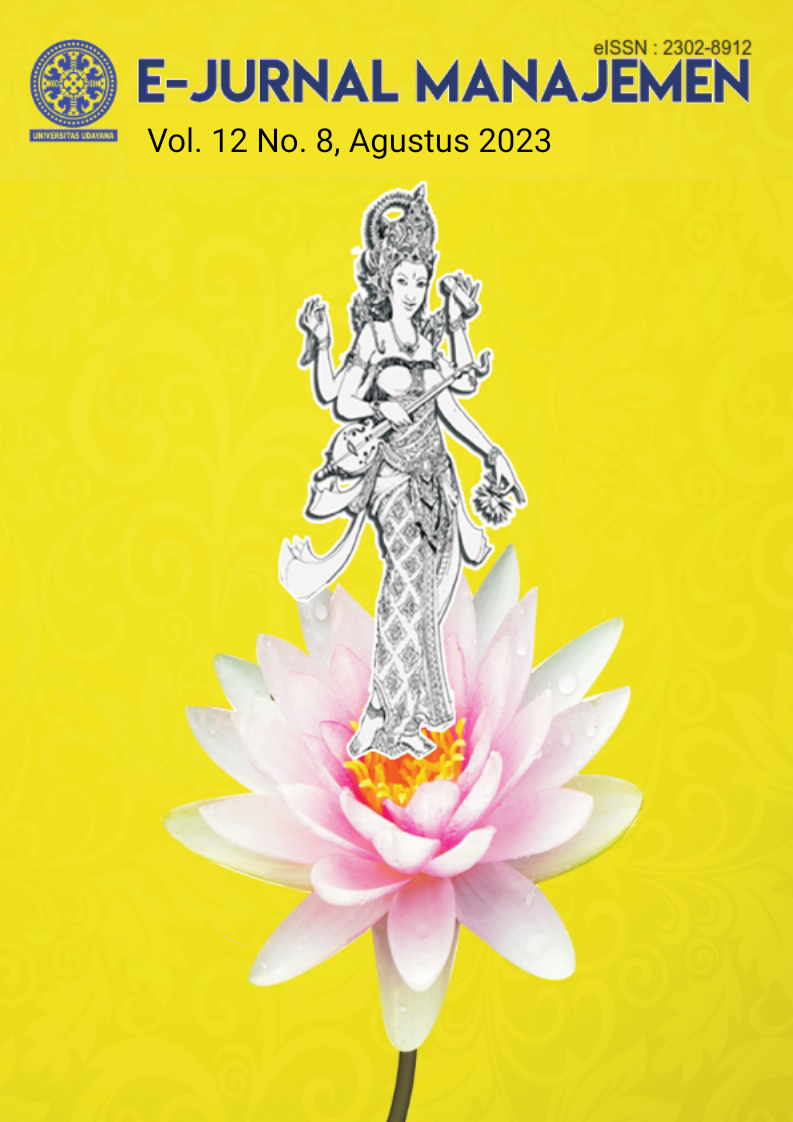PENGARUH WORK LIFE BALANCE, KEPUASAN KERJA, DAN STRES KERJA TERHADAP KINERJA PEGAWAI
Abstrak
Pesatnya perkembangan persaingan di era globalisasi membuat karyawan diharuskan bekerja lebih ekstra dan juga bekerja lebih giat demi mencapai tujuan organisasi dan demi menempatkan organisasi tersebut di dalam posisi yang dapat bersaing. Timbul suatu ketidakseimbangan dalam work – life balance, rasa tidak puas dalam menyelesaikan pekerjaan, dan tekanan dalam bekerja yang menimbulkan stres kerja yang dapat menurunkan kinerja pegawai. Tujuan penelitian ini untuk menguji secara empiris pengaruh work – life balance, kepuasan kerja, dan stres kerja terhadap kinerja pegawai. Penelitian ini dilakukan di Dinas Kependudukan dan Pencatatan Sipil Kota Denpasar dengan jumlah sampel sebanyak 125 orang pegawai yang terdiri dari 49 pegawai ASN dan 76 pegawai Non – ASN dengan menggunakan teknik analisis regresi berganda. Hasil penelitian menunjukkan bahwa work – life balance berpengaruh positif dan signifikan terhadap kinerja pegawai. Kepuasan kerja berpengaruh positif dan signifikan terhadap kinerja pegawai. Stres kerja berpengaruh negatif dan signifikan terhadap kinerja pegawai. Implikasi secara teoritis berdasarkan teori Hierarki Kebutuhan Abraham Malow, menunjukkan bahwa work – life balance merupakan aspek keseimbangan yang dibutuhkan dalam kegiatan sosial manusia, Kepuasan kerja menunjukkan dapat memenuhi seluruh kebutuhan dari teori tersebut, dan stres kerja merupkaan bentuk gagalnya pegawai dalam menghadapi tekanan dan dalam mengatur waktunya. Implikasi secara praktis dapat menjadi bahan pertimbangan dan masukan bagi manajemen kepala Dinas Kependudukan dan Pencatatan Kota Denpasar dalam meningkatkan kinerja pegawai dengan mempertimbangkan work - life balance, kepuasan kerja, stres kerja.
The rapid development of competition in the era of globalization makes employees required to work more and also work harder to achieve organizational goals and to place the organization in a competitive position. An imbalance arises in the work-life balance, a feeling of dissatisfaction in completing work, and pressure at work which causes work stress which can reduce employee performance. The purpose of this study was to test empirically the effect of work-life balance, job satisfaction, and work stress on employee performance. This research was conducted at the Department of Population and Civil Registration of Denpasar with a total sample of 125 employees which consist of 49 contracted employees and 76 non contracted employee using multiple regression analysis techniques. The results of the study show that work - life balance has a positive and significant effect on employee performance. Job satisfaction has a positive and significant effect on employee performance. Work stress has a negative and significant effect on employee performance. Theoretical implications based on Abraham Malow's Hierarchy of Needs theory, show that work - life balance is an aspect of balance needed in human social activities, job satisfaction shows being able to fulfill all the needs of the theory, and work stress is a form of employee failure in dealing with pressure and in managing time. Practical implications can be taken into consideration and input for the head management Department of Population and Civil Registration of Denpasar in improving employee performance by considering work - life balance, job satisfaction, work stress.
##plugins.generic.usageStats.downloads##
Referensi
Al-Ali, W., Ameen, A., Isaac, O., Khalifa, G. S. A., & Shibami, A. H. (2019). The mediating effect of job happiness on the relationship between job satisfaction and employee performance and turnover intentions: A case study on the oil and gas industry in the United Arab Emirates. Journal of Business and Retail Management Research, 13(4).
Ardiansyah, C. A., & Surjanti, J. (2020). Pengaruh work life balance terhadap kinerja karyawan melalui komitmen organisasi pada karyawan PT. Bhinneka Life Indonesia Cabang Surabaya. Jurnal Ilmu Manajemen, 8(4), 1211–1221.
Badrianto, Y., & Ekhsan, M. (2021). Pengaruh Work-life Balance terhadap Kinerja Karyawan yang di Mediasi Komitmen Organisasi. Jesya (Jurnal Ekonomi Dan Ekonomi Syariah), 4(2), 951–962.
Bataineh, K. A. (2019). Impact of work-life balance, happiness at work, on employee performance. International Business Research, 12(2), 99–112.
Cahyana, I. G. S., & Jati, I. K. (2017). Pengaruh Budaya Organisasi, Stres Kerja dan kepuasan kerja terhadap kinerja pegawai. E-Jurnal Akuntansi, 18(2), 1314–1342.
Dewi, C. N. C., Bagia, I. W., & Susila, G. P. A. J. (2018). Pengaruh stres kerja dan kepuasan kerja terhadap kinerja karyawan pada bagian tenaga penjualan UD Surya Raditya Negara. BISMA: Jurnal Manajemen, 4(2), 154–161.
Dina, D. (2018). Pengaruh work-life balance terhadap kinerja karyawan DI KUD Minatani Brondong Lamongan. Jurnal Indonesia Membangun, 17(2), 1–16.
Ehsan, M., & Ali, K. (2019). The impact of work stress on employee productivity: Based in the banking sector of Faisalabad, Pakistan. International Journal of Innovation and Economic Development, 4(6), 32–50.
Eliyana, A., Ma’arif, S., & others. (2019). Job satisfaction and organizational commitment effect in the transformational leadership towards employee performance. European Research on Management and Business Economics, 25(3), 144–150.
Foanto, E. F., Tunarso, E. B., & Kartika, E. W. (2020). Peran Work Life Balance Terhadap Kinerja Karyawan Melalui Komitmen Afektif Sebagai VariabelMediasi Pada Karyawan Hotel Berbintang Tiga Di Makassar, Sulawesi Selatan. Jurnal Manajemen Perhotelan, 6(1), 37–45.
Hendro, T. (2018). Pengaruh Kompensasi Dan Kepuasan Kerja Terhadap Kinerja Karyawan Tetap CV. Karya Gemilang. Agora, 6(1).Indriani, A., Yuliantini, N. N., & Bagia, I. W. (2019). Pengaruh Stres Kerja dan Budaya Kerja Terhadap Kinerja Karyawan. Jurnal Manajemen Indonesia, 7(1), 33–41.
Johari, J., Tan, F. Y., & Zulkarnain, Z. I. T. (2018). Autonomy, workload, work-life balance and job performance among teachers. International Journal of Educational Management.
Lukito, L. H., & Alriani, I. M. (2018). Pengaruh Beban Kerja, Lingkungan Kerja, Stres Kerja Terhadap Kinerja Karyawan Pada PT. Sinarmas Distribusi Nusantara Semarang. Jurnal Ekonomi Manajemen Dan Akuntansi, 25(45), 24–35.
Massie, R. N., Areros, W. A., & Rumawas, W. (2018). Pengaruh stres kerja terhadap kinerja karyawan pada kantor pengelola It Center Manado. Jurnal Administrasi Bisnis (JAB), 6(002).
Mendis, M., & Weerakkody, W. A. S. (2017). The impact of work life balance on employee performance with reference to telecommunication industry in Sri Lanka: a mediation model. Kelaniya Journal of Human Resource Management, 12(1), 72–100.
Muliawati, T., & Frianto, A. (2020). Peran work life balance dan kepuasan kerja terhadap kinerja karyawan milenial: Studi literatur. Jurnal Ilmu Manajemen (JIM), 8(2), 606–619.
Nabawi, R. (2019). Pengaruh Lingkungan Kerja, Kepuasan Kerja dan Beban Kerja Terhadap Kinerja Pegawai. Maneggio: Jurnal Ilmiah Magister Manajemen, 2(2), 170–183. https://doi.org/10.30596/maneggio.v2i2.3667
Nugraha, R., Wolor, C. W., & Yohana, C. (2022). The Effect of Work from Home, Work-Life Balance, and Job Satisfaction on Employee Performance. Oblik i Finansi, 95, 103–112.
Nurwahyuni, S. (2019). Pengaruh Beban Kerja Terhadap Kinerja Karyawan Melalui Work Life Balance (Studi Kasus PT. Telkom Indonesia Regional V). Jurnal Ilmu Manajemen (JIM), 7(1), 1–9.
Pandey, D. L. (2020). Work stress and employee performance: an assessment of impact of work stress. International Research Journal of Human Resource and Social Sciences, 7(05), 124–135.
Poluan, alfian ranny. (2018). Pengaruh Work-Life Balance, Beban Kerja Dan Gaya Kepemimpinan Terhadap Kinerja Pegawai PT. Bank Negara Indonesia (Persero) TBK, Kantor Cabang Manado.
Rene, R., & Wahyuni, S. (2018). Pengaruh work-life balance terhadap komitmen organisasi, kepuasan kerja, dan motivasi kerja terhadap kinerja individu pada karyawan organisasiasuransi di jakarta. Jurnal Manajemen Dan Bisnis Sriwijaya, 16(1), 53–63.
Rinny, P., Purba, C. B., & Handiman, U. T. (2020). The influence of compensation, job promotion, and job satisfaction on employee performance of Mercubuana University. International Journal of Business Marketing and Management (IJBMM), 5(2), 39–48.
Robbins, S. P., & Judge, T. A. (2019). Sikap dan Kepuasan Kerja. In A. Susila & P. P. Lestari (Eds.), Perilaku organisasi : Organizational Behaviour(16th ed., pp. 43–57). Penerbit Salemba Empat
Rosmaini, R., & Tanjung, H. (2019). Pengaruh Kompetensi, Motivasi Dan Kepuasan Kerja Terhadap Kinerja Pegawai. Maneggio: Jurnal Ilmiah Magister Manajemen, 2(1), 1–15.
Shakila, M., Mega, S. W., & Munawaroh, N. A. (2022). Pengaruh Work-Life Balance, Stres Kerja, Dan Kompensasi Terhadap Kinerja Karyawan (Studi Kasus Pada Auto 2000 Kediri Hasanudin). Cemerlang: Jurnal Manajemen Dan Ekonomi Bisnis, 2(3), 308–320.
Soomro, A. A., Breitenecker, R. J., & Shah, S. A. M. (2018). Relation of work-life balance, work-family conflict, and family-work conflict with the employee performance-moderating role of job satisfaction. South Asian Journal of Business Studies, 7(1), 129–146.
Tasman, T., Siregar, Z. M. E., & Nasution, M. F. (2021). The influence of work environment, promotion, and job satisfaction on employee performance. Budapest International Research and Critics Institute-Journal (BIRCI-Journal), 4(3), 4026–4031.
Teoh, K. B., Cordova, M., Hor, S. N., Lim, C. H., Yeoh, L. K., Madhu, A., Warrier, U., Chan, J. J., Kee, D. M. H., Florence, E., & others. (2021). The factors of employee performance: A study of SearchNEasy. Asia Pacific Journal of Management and Education (APJME), 4(1), 82–96.




















